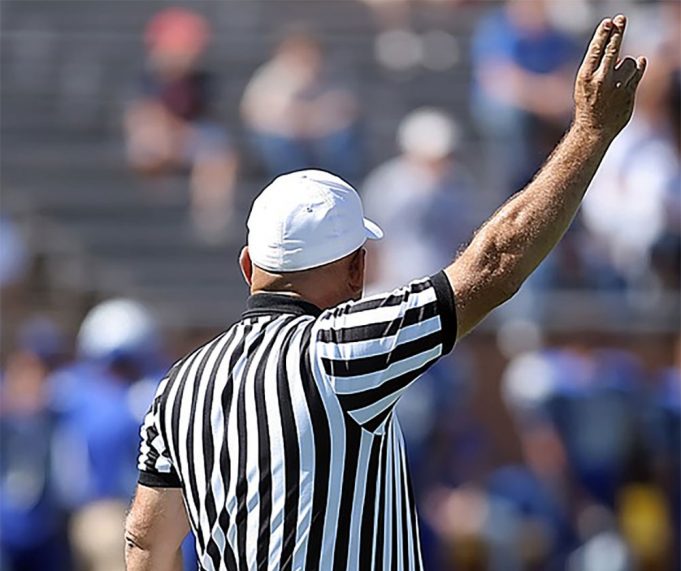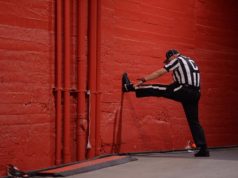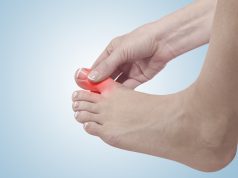News bulletin: We’re all aging, and there’s nothing we can do about it. We’ll progressively become slower and less limber. Having left the football field and moved to the replay booth a few years ago, after a 43-year onfield career, I can attest to the sense of wonder that one feels when it’s all over and the question is, “Where did the time go?”
Until retirement day comes, however, what can you do to keep performing at an optimal (or near) level as the years slip by? If you take proper preventive measures, you can push the point at which you have to give it up, without people talking behind your back and asking why you’re still hanging around.
One thing you can do is keep the weight off. For years people have dwelled on the myriad reasons you need to stay slim and trim, but it becomes even more necessary as you get older. If you keep the pounds off, you won’t slow up as much.
As you get older it also becomes more important that you stay in good physical condition by lifting light weights and doing aerobic exercise.
Give some thought to altering your workout routine. I stopped jogging when I reached my mid-50s. I had been jogging since I quit playing baseball in 1969, because I found that it took an increasingly greater toll on my hips and knees.
Instead, I took up bicycling. I often bike on hilly terrain at a good, consistent pace for as much as three hours, and I find that when I’m finished, I got a heckuva workout and nothing hurts.
Others might want to engage in other low-impact activities such as swimming, yoga or elliptical workouts.
It’s also imperative that you make conditioning a year-round proposition. More than one colleague suffered an injury because he was a couch potato until a month before the season, then dashed to the nearest high school track and started running wind sprints. Young people can get away with that. Not us older folks.
You need to do more stretching, before and after games. You can’t just jump out of our car and hit the court or field as you used to do, because the likelihood of pulling a hamstring or encountering a similar physical problem becomes greater as the calendar does its thing.
I consulted a professional about a multi-dimensional routine a few years ago and have forced myself to stick with it. There is no doubt that it helped me to do my job better when I was on the field. I also found that when I got out of the car after a two-hour ride after a game, it didn’t take me 10 minutes to hobble into the hotel or my house.
I stress the need to consult a professional regarding stretching. Lots of people have done serious damage to themselves by embarking on self-created stretching programs. That can be an especially dangerous pitfall for those who once were good athletes.
Attitudes about what should and should not be done change over time, and what was once acceptable practice may become anathema. You may remember how we used to do rapid, up-and-down touch-your-toes. Now a personal trainer who allowed that might be sued for negligence.
Another adjustment one might consider is modifying the schedule. Taking fewer games can keep you from getting burned out, to say nothing about bettering your family life. But it can also preserve your shelf life. What you do on the court or field takes a toll on your body no matter how old you are, but even moreso as you get up there in years. Shortening your schedules as you get older will reduce the wear and tear and, most likely, improve your performance in the games you work.
Serving as an emergency fill-in as opposed to being a regular can be a godsend to an assigner when weather-related issues lead to makeup games. Beware, however, that you can sometimes wind up working more games than when you were a regular. Be helpful but make it clear to assigners that you are cutting back.
You can stay involved in officiating by mentoring or observing officials. It will give you a physical as well as a mental break while you are “giving back” to the avocation. The lessons you learned over the years are valuable to less-experienced officials. Talk to your assigner or coordinator to find out what needs they have in that area.
It has also been suggested that drinking more water is advisable as one gets older. None of us probably drink enough water, but it can help keep you healthy in a general sense and in better shape while you’re officiating. You can’t afford to load up so much that a bathroom break is needed in the middle of the second quarter or third inning, but you can sip before and after games, between quarters and during timeouts.
Although I’m still in good shape and believe I could work on the field, I realized a couple of years ago that I was slowing down and not covering the needed territory quite as well as I used to do. I’m fortunate that the replay opportunity came along. It afforded me the ability to stay connected with the game.
Until my last game, however, I did what I could, and I know it helped me to continue to perform at a reasonably high level.
You can’t stop the days from ticking by, but you can take steps to make the ticking less painful than it might be.
What's Your Call? Leave a Comment:
Note: This article is archival in nature. Rules, interpretations, mechanics, philosophies and other information may or may not be correct for the current year.
This article is the copyright of ©Referee Enterprises, Inc., and may not be republished in whole or in part online, in print or in any capacity without expressed written permission from Referee. The article is made available for educational use by individuals.


















